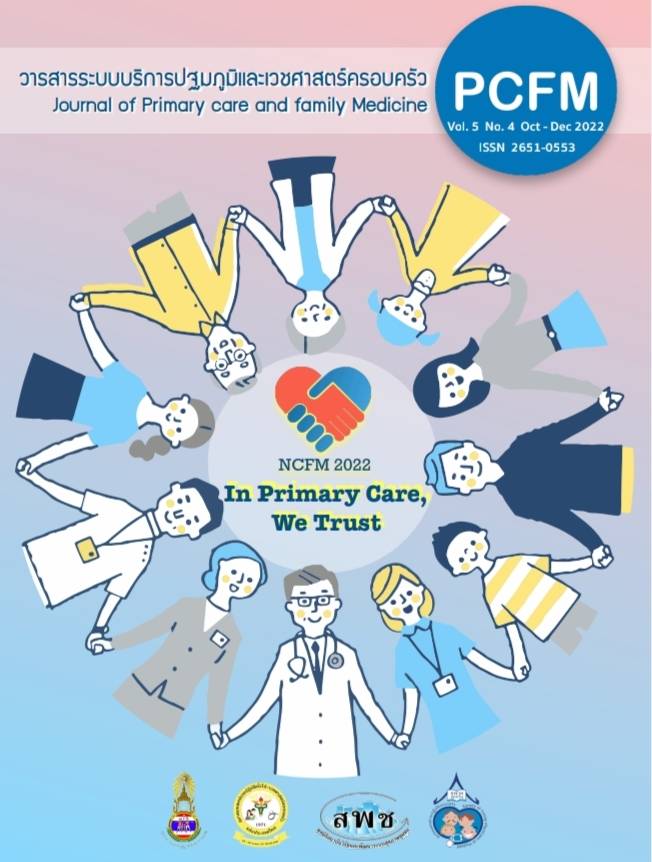ปัจจัยที่สัมพันธ์กับพฤติกรรมการดูแลตนเองของบุคคลกลุ่มเสี่ยงต่อการเกิดโรคหลอดเลือดสมอง ในจังหวัดนครราชสีมา
Main Article Content
บทคัดย่อ
ความเป็นมาและวัตถุประสงค์: พฤติกรรมการดูแลตนเองมีความสำคัญในการป้องกันและจัดการโรคหลอดเลือดสมอง การวิจัยนี้มีวัตถุประสงค์เพื่อศึกษาปัจจัยที่สัมพันธ์กับพฤติกรรมการดูแลตนเองของบุคคลกลุ่มเสี่ยงต่อการโรคหลอดเลือดสมอง ในจังหวัดนครราชสีมา
ระเบียบวิธีวิจัย: การศึกษาเชิงสหสัมพันธ์กลุ่มตัวอย่างคือบุคคลกลุ่มเสี่ยงต่อการเกิดโรคหลอดเลือดสมองที่มารับบริการที่โรงพยาบาลส่งเสริมสุขภาพตำบล ในจังหวัดนครราชสีมา จำนวน 262 คน เลือกกลุ่มตัวอย่างโดยวิธีการสุ่มอย่างง่าย เก็บข้อมูลโดยใช้แบบสอบถาม 6 ฉบับ ระหว่างเดือนกรกฎาคม ถึงตุลาคม พ.ศ. 2564 วิเคราะห์ข้อมูลโดยใช้สถิติเชิงบรรยาย และสัมประสิทธิ์สหสัมพันธ์ของเพียร์สัน
ผลการศึกษา: พฤติกรรมการดูแลตนเองของกลุ่มตัวอย่างอยู่ในระดับปานกลาง (M = 39.41, SD = 7.60) ปัจจัยที่สัมพันธ์ทางบวกกับพฤติกรรมการดูแลตนเอง คือ อาการเตือนของโรคหลอดเลือดสมอง การสนับสนุนทางสังคม และรายได้ อย่างมีนัยสําคัญทางสถิติ (r= .64, p<0.001; r = .38, p<0.001; และ r = .37, p<0.001ตามลำดับ) ส่วนปัจจัยที่สัมพันธ์ทางลบกับพฤติกรรมการดูแลตนเอง อย่างมีนัยสําคัญทางสถิติ คือ ความเครียดและอายุ (r= -.60, p<0.001; และ r= -.36, p<0.001 ตามลำดับ)
สรุป: การวิจัยครั้งนี้ค้นพบปัจจัยที่สัมพันธ์กับพฤติกรรมการดูแลตนเองของบุคคลกลุ่มเสี่ยงต่อการเกิดโรคหลอดเลือดสมองซึ่งเป็นประโยชน์ต่อบุคคลากรทางสุขภาพในการป้องกันโรคหลอดเลือดสมองในชุมชนต่อไป
Article Details

อนุญาตภายใต้เงื่อนไข Creative Commons Attribution-NonCommercial-NoDerivatives 4.0 International License.
เนื้อหาและข้อมูลในบทความที่ลงตีพิมพ์ในวารสาร PCFM ถือเป็นข้อคิดเห็นและความรับผิดชอบของผู้เขียนบทความโดยตรง ซึ่งกองบรรณาธิการวารสารไม่จำเป็นต้องเห็นด้วยหรือร่วมรับผิดชอบใด ๆ
บทความ ข้อมูล เนื้อหา รูปภาพ ฯลฯ ที่ได้รับการตีพิมพ์ลงในวารสาร PCFM ถือเป็นลิขสิทธิ์ของวารสาร PCFM หากบุคคลหรือหน่วยงานใดต้องการนำทั้งหมดหรือส่วนหนึ่งส่วนใดไปเผยแพร่ต่อหรือเพื่อกระทำการใด ๆ จะต้องได้รับอนุญาตเป็นลายลักษณ์อักษรจากวารสาร PCFM ก่อนเท่านั้น
เอกสารอ้างอิง
Chandra A, Stone R, Du X, Li A, Huber M, Bremer R, Ding Y. The cerebral circulation and cerebrovascular disease III: Stroke. Brain circulation (2017); 3(2): 66-77.
Virani S, Alonso A, Benjamin J, Bittencourt S, Callaway W, Carson P, Delling N. Heart disease and stroke statistics—2020 update: a report from the American Heart Association. Circulation (2020); 141(9): e139-e596.
Suttisrisin C. Factors effecting to disease prevention behaviors in risk group for stoke at Chaloem Phra Kiat Hospital, Nakhon Ratchasima Province. Thai Health Science Journals (2018); 25(1): 5-15.
Channuan S, Panomai N. Perception and self-care behavior to prevent stroke in diabetic patients at Khonsawan Hospital, Chaiyaphum Province. Journal of Sakon Nakhon Hospital (2018); 21(2): 120-128.
Riegel B, Moser K, Buck G, Dickson V, Dunbar B, Lee S, Treat‐Jacobson J. Self‐care for the prevention and management of cardiovascular disease and stroke: A scientific statement for healthcare professionals from the American Heart Association. Journal of the American Heart Association (2017); 6(9): e006997.
Watcharanurak P, Klubklay A. Factors influencing preventive behavior among stoke-risk patients in songkhla province. The Southern College Network Journal of Nursing and Public Health (2017); 4(1): 217-233.
Ahn S, Song R, Choi W. Effects of self-care health behaviors on quality of life mediated by cardiovascular risk factors among individuals with coronary artery disease: A structural equation modeling approach. Asian Nursing Research (2016); 10(2): 158-163.
Riegel B, Jaarsma T, & Strömberg A. A middle-range theory of self-care of chronic illness. Advances in Nursing Science (2012); 35(3): 194-204.
Klinsakorn C, Saetan S. Factors Related to Self-Protective Behavior of Stroke with Controlled Hypertension Patients Who Live in Danchang District, Suphanburi Province. Journal of Council of Community Public Health. 2020; 2(2): 62-77.
Chanaphan Y, Settheetham D. Factors associated with stroke prevention behavior among hypertension patients in Kumpawapi District, Udon Thani Province. Journal of Sakon Nakhon Hospital (2018); 21(2): 109-119.
Kumpangkaew K, Somboontanont W, Leelahakul V. Relationships between Perceived Risk, Perceived warning signs and self-care behavior in older adults at risk of cerebrovascular disease. Nursing Journal of the Ministry of Public Health (2015); 25(2): 40-56.
Cohen J. Statistical power analysis for the behavioral sciences. 2nd ed. Lawrence Erlbaum: New Jersey; (1988).
Zimet G, Powell S, Farley G, Werkman S, Berkoff K. Psychometric characteristics of the multidimensional scale of perceived social support. Journal of personality assessment (1990); 55(4): 610-617.
Wongpakaran T, Wongpakaran N, Ruktrakul R. Reliability and validity of the multidimensional scale of perceived social support (MSPSS): Thai version. Clinical Practice & Epidemiology in Mental Health (2011); 7(0): 161–166.
Mahatnirunkul S, Pumpaisanchai W, Tapanya P. Research report: the construction of Suanprung Stress Test for Thai population. Bulletin of Suan Prung (1997); 13(3): 1-11.
Samdaengsarn D, Chinnawong T, Thaniwatthananon P. Factors related to treatment adherence in older persons with hypertension. Songklanagarind Journal of Nursing (2019); 39(3): 51-66.
Sug Yoon S, Heller F, Levi C, Wiggers J, Fitzgerald E. Knowledge of stroke risk factors, warning symptoms, and treatment among an Australian urban population. Stroke (2001); 32(8): 1926-1930.
Fivecoat C, Sayers L, Riegel B. Social support predicts self-care confidence in patients with heart failure. European Journal of Cardiovascular Nursing (2018); 17(7): 598-604.
Park J, Kim S. The effects of social support and recovery resilience on self-care behavior among the elderly with hypertension in the senior welfare center. Journal of the Korea Academia-Industrial cooperation Society (2019); 20(7): 182-191.
Yang S-O, Jeong H, Kim S-J, Lee H. Correlates of self-care behaviors among low-income elderly women with hypertension in South Korea. Journal of Obstetric, Gynecologic & Neonatal Nursing (2014); 43(1): 97-106.
Liu Y, Li N, Li A, Khan H. Association between psychosocial stress and hypertension: a systematic review and meta-analysis. Neurological research (2017); 39(6): 573-580.
Saleema L, Panpakdee O, Arpanantikul M, Chai-Aroon T. The influence of basic conditioning factors and self-care agency on self-care behaviors in Thais with hypertension. Pacific Rim International Journal of Nursing Research (2016); 20(1): 5-17.


